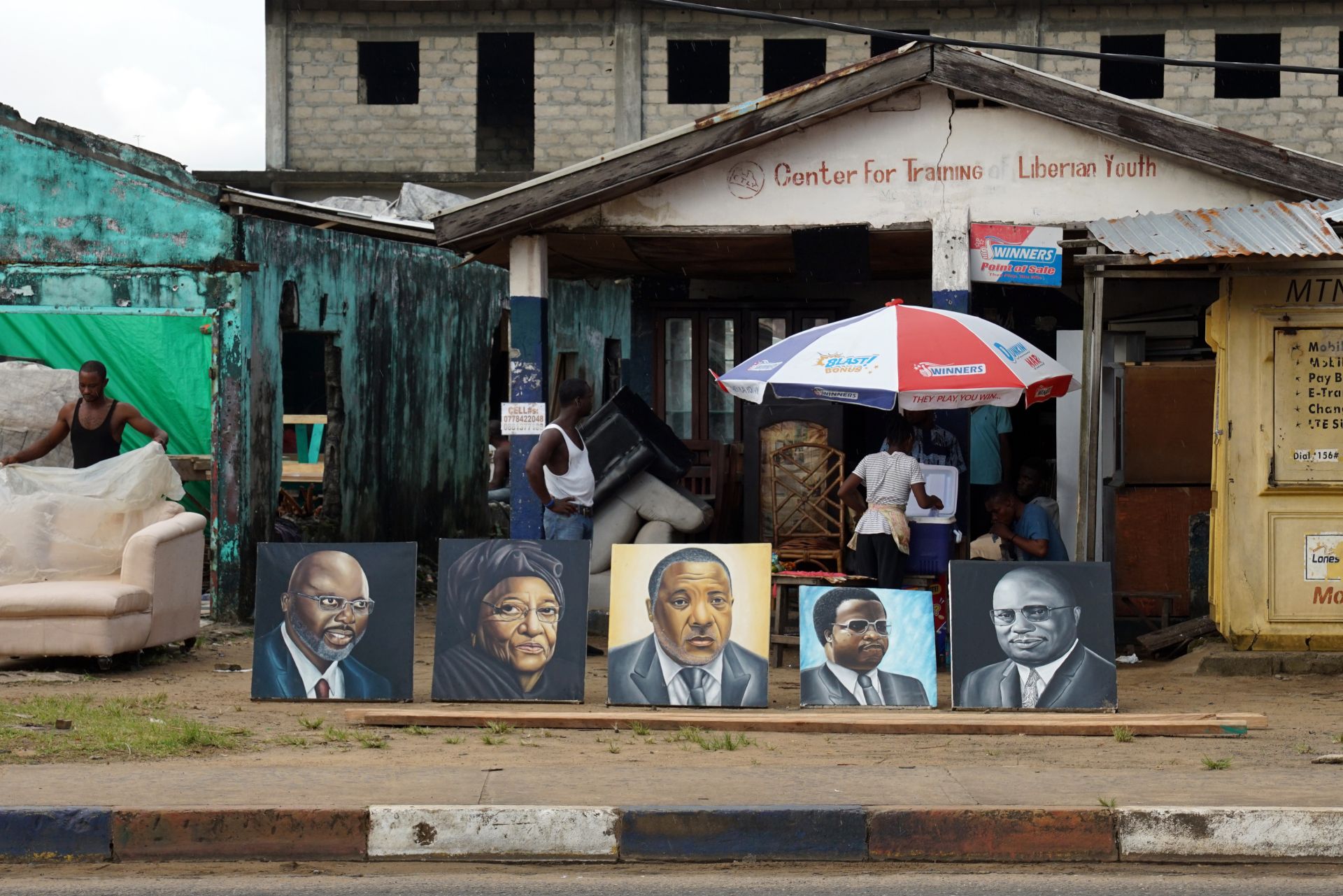On Friday, Nov. 17, at around 11 p.m., George Weah, Liberia’s footballer-turned-president, conceded defeat on state radio in one of the most fiercely contested elections in the West African nation’s history, just days before an official result was declared. After months of aggressive rhetoric and campaigning, with both ruling and opposition parties prematurely parading the streets claiming victory, Weah took Liberians and the world by surprise. He acknowledged that Joseph Boakai, the leader of the opposition Unity Party (UP), who was ahead by around 28,000 votes, had in fact won, and called to congratulate him. In a region where eight coups have unfolded in the past three years, presidents have extended term limits and elections have lacked credibility, Weah’s acknowledgment of the opposition’s victory stood out.
“Tonight, the CDC” — the Congress for Democratic Change, Weah’s party — “has lost the election, but Liberia has won,” he said. “This is a time for graciousness in defeat, a time to place our country, and patriotism, above personal interest.” He called on members of the CDC, who had attacked the credibility of the National Elections Commission, to accept the results.
Weah’s speech moved many Liberians, whose distrust of the political establishment and government institutions has been shaped by a painful history of oppression, corruption and violent conflict.
Robert Pyne, 73, who lived through one-party rule, a brutal coup and a civil war, was touched by Weah’s words, even if he was sad to see his candidate voted out. “That man, he a good man,” he told New Lines, speaking in Liberian English. “They got some presidents in Africa, they not move — o,” he said, referring to recent scandals where defeated leaders failed to leave office. But Weah’s concession moved him. “The way he do it, I like it. No problem, no trouble, no nothing, because he want peace.”
Pyne knows all too well the turmoil contested election results can cause. In 1985 he voted for an opposition leader in elections that many believed were rigged. Samuel Kanyon Doe, a soldier who led a bloody coup in 1980, was elected president in the first round with 50.95% of the vote. Doe’s refusal to concede or step down for a civilian leader paved the way for the devastating civil war that followed. Pyne hoped Weah’s acceptance of defeat was a sign Liberia was now firmly on the path to peace.
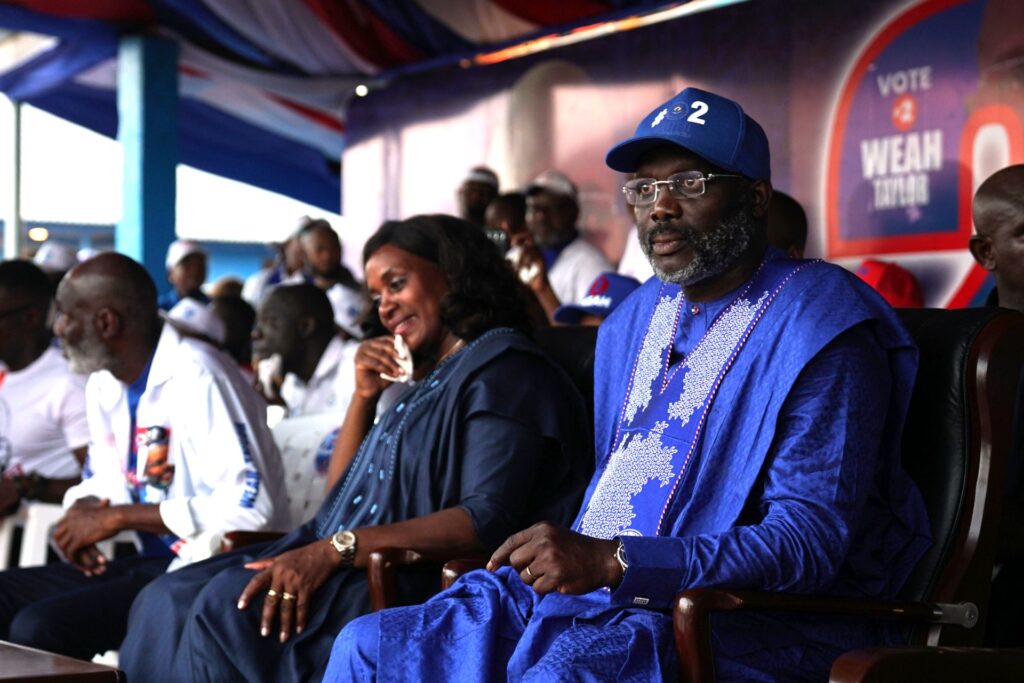
Pyne’s friend, Ansu Kromah, whose 21-year-old son Morris was shot dead during demonstrations over the 2011 elections, accepted the president’s decision but still did not believe the vote was credible, a position that senior members of Weah’s party maintain. “When it come to the election vote it was not fair,” he said. “Even though we were angry, we wanted to get on the street … but the man [Weah] said we should forget it and when you love somebody, and they say stop, so we stop it.”
Remarkably, this was only the second time since the election of 1877 that an incumbent had accepted defeat, and the first time a Liberian president had only served one term. For more than a century, Liberian democracy was the dominion of freed slaves from the United States, who established the first republic in Africa in 1847. The settlers, referred to as Americo-Liberians, dominated politics until a brutal military coup in 1980, which paved the way for indigenous Liberians to vote, and a 14-year civil war that killed 250,000 people and shattered the nation and its infrastructure.
“Historically, in terms of real democracy, this is the first and he [Weah] passed the test by conceding in a very closely contested race with a 1% lead — in many parts of Africa this would not easily happen,” Tiawan Gongloe, a human rights lawyer and presidential candidate, told New Lines.
It was also Liberia’s first election since the end of the period of civil war — which began on Dec. 24, 1989 and ended on Aug. 18, 2003 — that was conducted without the help of international actors and saw both parties accept the results. While many saluted Weah’s graciousness, others saw it as a sign of Liberia’s voters asserting themselves and the “maturing” of Liberian democracy. Liberian people had finally voted out a government that they saw as failing them, said Ibrahim Al-bakri Nyei, who leads the Ducor Institute, a Liberian think tank. Weah’s government had been accused of widespread corruption, government auditors had been found dead in suspicious circumstances and the independence of the judiciary was being undermined.
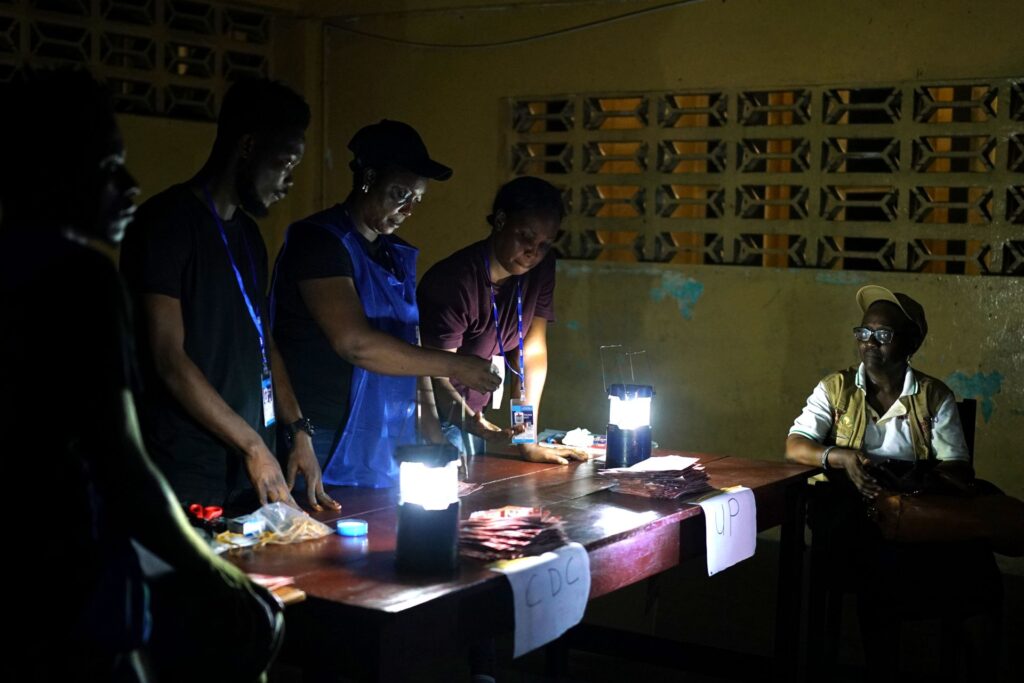
As a journalist who has covered three of Liberia’s four postwar elections, which have been marred by violence and marked by political intrigue, Weah’s acknowledgment of defeat was unexpected. When the final results were almost counted, market women and workers closed shop early and students had been asked to stay home. Reporters like myself were on the alert for rioting — and with good reason. The leadership of the CDC had called for the dismissal of the data manager at the National Elections Commission and accused the head of the Elections Coordinating Committee, a leading civil society election monitoring group, of being a member of the opposition party, which led the U.S. Embassy to threaten sanctions against them. Boakai’s UP claimed they had won the first round with 52% of the vote and were backed by a notorious warlord who called for an uprising, should the results not be free and fair. A handful of Boakai supporters I spoke with, who had been inspired by the storming of the Capitol in the United States in 2021, said they were willing to do the same in Monrovia if the ruling party tried to rig the elections.
While Weah was applauded for his graceful gesture, political campaigning had been anything but civil. CDC supporters mobilized with a mock casket meant to contain the imaginary corpse of Boakai. Opposition supporters called Weah a “zogo,” a pejorative word for a drug addict who lives on the street, because of his failure to handle an epidemic of drug abuse. Both parties used military analogies in their campaigns. The UP, who drew support from multiple former war figures, called their campaign a “Rescue Mission,” that would save the state from catastrophe. The ruling party likened one of its rallies to Operation Octopus, a deadly siege of Monrovia in 1992 that killed thousands.
Members of civil society felt threatened, particularly by the ruling party. “We were targeted,” said Esther Davis Yango, the head of the Women’s NGO Secretariat of Liberia, which was part of the Elections Coordinating Committee that reported on incidents of election violence and intimidation at a major tally centre in Monrovia. “The CDCians were ready to cause chaos, to use violence because they knew the elections were not in their favor. So, they were ready to do anything to maintain their position, but thankfully Weah, he being a peaceful person, was able to speak ahead of time and curtail the situation.”
In fact, all signs pointed to both sides causing chaos, even if their leaders did not support it.
Despite Liberia’s postwar elections being largely deemed credible by local and international observers, parties have often cried foul. In 2005, the CDC contested the election results that saw the UP candidate Ellen Johnson Sirleaf become Africa’s first democratically elected female head of state. In 2011, the CDC boycotted the second round, after an election commissioner accidentally declared Winston Tubman, who was running for president with Weah as his VP, the winner of the first round, before retracting his statement. (Liberia’s elections usually go to a runoff if no party claims 50% plus one vote). Angry partisans mobilized to demonstrate. Police fired teargas. Demonstrators threw rocks. Police responded with live rounds and tried to storm the compound, before being stopped by United Nations peacekeepers. Sirleaf won a second term with a landslide victory. Mass demonstrations were expected in the run-up to her inauguration. The nation felt as though it might erupt into violence. A few months later, Weah and Tubman showed up at Sirleaf’s inauguration and it was all over.
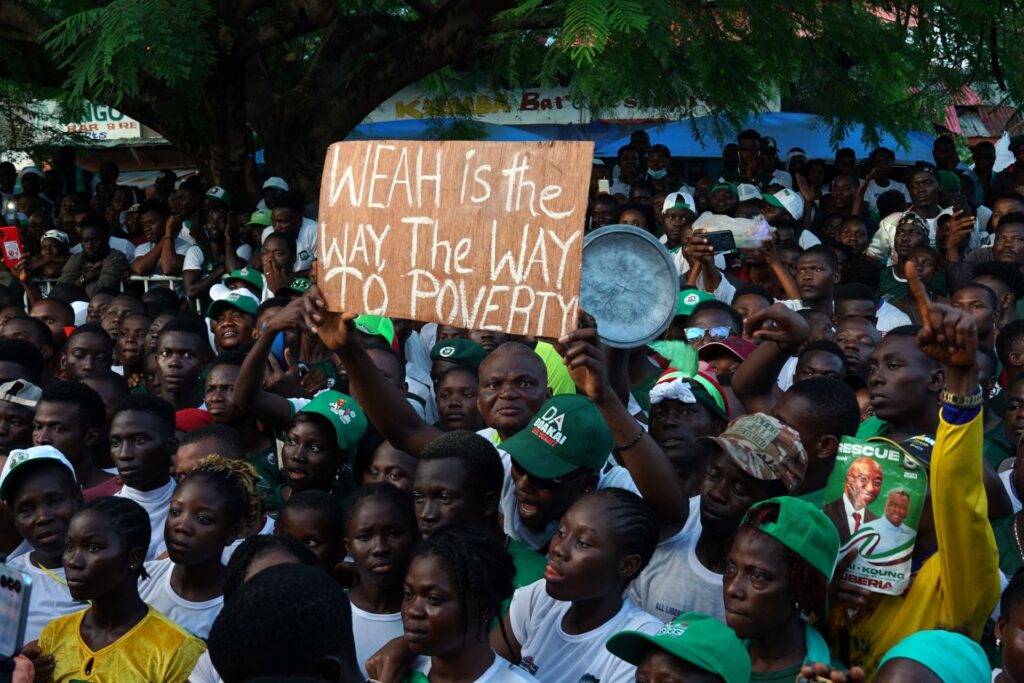
During the elections of 2017, the ruling UP expelled sitting president Sirleaf for refusing to support Joseph Boakai, her vice president, in his bid for the presidency. The vote was legally contested, and the runoff was delayed more than a month. Boakai claimed fraud but backed down, he said, for the sake of the nation. These were the first elections Liberia had conducted independently and since the departure of thousands of U.N. peacekeepers in 2018.
When the election results were finally announced, after the election commissioners were given a final hammering by the press, a journalist asked how they felt about the elections that had been applauded by regional and international observer missions. Commissioner Davidetta Browne-Lansanah praised the public for reporting issues at the polls. Another commissioner expressed pride about making history. Boakai A. Dukly, an elder among the commissioners, underlined how significant these results were. “We have come a long way, a very long way, and you find yourself very lucky that you are living during these times in Liberia, that you can now come, sit, record and hear the results of a highly competitive election, that shows that the country is divided into two halves, without a shot fired. I just want you to think about that and try to preserve this particular thing that you have,” he said.
As the official results were announced in this year’s poll, police in riot gear, holding tear gas launchers, stood in front of barricades outside the election commission. In front of them a small gathering of Boakai supporters sang “George Weah Go!” like a church choir, before dispersing. Revellers danced at Boakai’s party headquarters in the centre of town, before a driver rammed into the crowd at around 10 p.m., killing three and injuring 24. The man fled. A mob burned his car. People carried the injured to the hospital using taxis, auto rickshaws and motorbikes. My colleagues and I arrived on the scene soon after. Blood stained the dark streets outside of the party headquarters. A Boakai supporter yelled: “They are coming here to kill people!” Fingers were pointed at suspects on the scene and the CDC party leadership. A colleague and I steeled ourselves for possible retaliation. The UP leadership called it a “terrorist attack” that same evening, while senior UP figures shortly after claimed it was an accident.
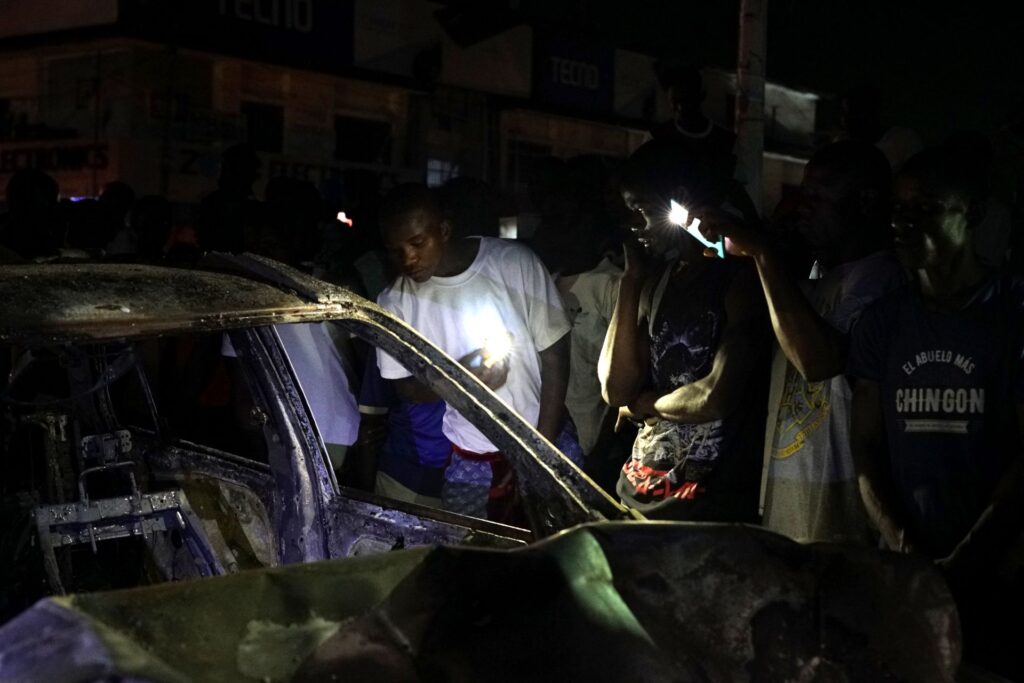
Outside the hospital, where the injured lay maimed and bloodied, I met Jeffrey Sannoh, a 31-year-old student, who had lost his sister-in-law, Mariama Koroma, 29, and his brother Sulieman Banja, 31, in the attack. Two more of Sannoh’s family members had also been injured. Sannoh himself was not on the scene at the time but escorted Koroma unconscious to two hospitals before she was pronounced dead. Days later friends and family cried and prayed over the coffin of Koroma, a mother of three, who had sold onions and tomatoes in a wheelbarrow at the market in West Point, Monrovia’s largest slum, where the family lived. Banja, who was a motorcycle mechanic, was a father of four. In light of the tragedy, Boakai suspended further victory celebrations.
“No one expected that to happen,” Sannoh told New Lines. Given how closely citizens were following the case, he was confident justice would be served. The alleged perpetrator had been arrested within hours of the incident and was later charged with murder and aggravated assault and found to be a member of the ruling party. “I feeling hurt because of the loss of life. We were going to celebrate the election of the president and I don’t see anything wrong with that,” Sannoh told New Lines.
Despite questions remaining about the accident, Liberians on both sides of the political divide continued to praise Weah. Aaron Weah, a Liberian scholar (of no relation to the president) said that Liberia got lucky with Weah. “Weah’s action can be described as an uncommon moment of patriotism,” he told New Lines. “You can see how his action has been a rare moment of pride.” But Weah’s announcement was just a moment, he said, and more needed to be done to ensure that Liberia continued its 20 years of imperfect peace. “The prospects for major transformation are grim. If the right leadership is not in place and cannot sustain development progress over time, you will have a huge population that is vulnerable to violence,” Weah said, adding that the underlying conditions that caused the war — corruption, impunity, poverty and exclusion — still persisted. Weah believes that, although Boakai allied himself with former warlords like Prince Johnson to win the election, he may still pursue his campaign promises of prosecuting corruption, and perhaps even champion the establishment of a war crimes court.
Abraham Jabba, a 31-year-old public administration student who had voted for Weah and Tubman in previous elections, cast a ballot for Boakai to get the president out of office. He hopes the new government will take the issue of justice and corruption more seriously. He applauded Weah’s move but also argued the president had no other options. “I think Weah never had a choice, that was the best thing he could do, accept the result. If not, if he had done anything to rig the election, his next six years would have been chaotic because the Liberians would have raised a lot of tension, even far more than in his first term,” Jabba told New Lines.
Doris Nmah, 28, also a public administration student and Weah supporter, felt that his concession set a positive precedent for future elections. “He served as a good example for other leaders to follow tomorrow. If they know the Liberian people is not in favor of them, if the next party win, they should turn the government over to the next party in peace,” she said. “President George Manneh Weah is a peaceful man and I’m proud for what he did in Liberia.”
“Spotlight” is a newsletter about underreported cultural trends and news from around the world, emailed to subscribers twice a week. Sign up here.



